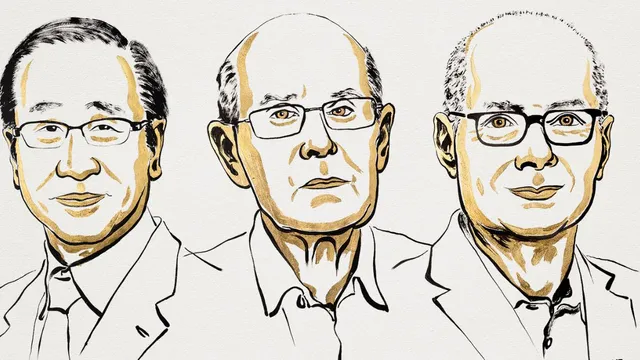- By Shivangi Sharma
- Wed, 08 Oct 2025 03:59 PM (IST)
- Source:JND
The Royal Swedish Academy of Sciences has awarded the 2025 Nobel Prize in Chemistry to Susumu Kitagawa, Richard Robson, and Omar M. Yaghi for their pioneering contributions to the development of metal–organic frameworks (MOFs). These innovative materials, built from metal ions linked with organic molecules, have revolutionised the field of chemistry by creating highly porous structures with vast potential in gas storage, catalysis, drug delivery, and environmental sustainability.
BREAKING NEWS
— The Nobel Prize (@NobelPrize) October 8, 2025
The Royal Swedish Academy of Sciences has decided to award the 2025 #NobelPrize in Chemistry to Susumu Kitagawa, Richard Robson and Omar M. Yaghi “for the development of metal–organic frameworks.” pic.twitter.com/IRrV57ObD6
The three laureates will share the prize money of 11 million Swedish crowns (about Rs 10 crore). Susumu Kitagawa, who holds a PhD in hydrocarbon chemistry from Kyoto University, Japan, is a professor at the same institution. He has previously been honoured with the Humboldt Research Prize (2008) and the De Gennes Prize, establishing himself as a leading figure in chemical sciences.
Richard Robson, originally from the United Kingdom, studied chemistry at the University of Oxford and currently teaches at the University of Melbourne, Australia. His contributions to the structural foundations of MOFs have been vital to their scientific advancement.
Omar M. Yaghi, born in Amman, Jordan, earned his PhD from the University of Illinois Urbana-Champaign, USA, and is now a professor at the University of California, Berkeley. His work has been instrumental in refining MOF structures for real-world applications, including water harvesting and carbon capture.
Creating New 'Rooms For Chemistry'
The Nobel Committee highlighted that MOFs are like molecular architectures with spacious rooms, allowing gases and chemicals to move freely through their structures. This property makes them highly versatile for practical use: capturing carbon dioxide to combat climate change, storing toxic gases safely, or even extracting water from arid desert air. By developing these frameworks, the laureates have provided entirely new tools to address some of humanity’s most pressing scientific and environmental challenges.
Nobel Week And Global Recognition
The chemistry prize follows Monday’s Nobel Prize in Medicine, awarded to Mary Brunkow and Fred Ramsdell of the United States, along with Japan’s Shimon Sakaguchi, for discoveries related to immune system regulation. Later this week, the literature prize will be announced on Thursday, followed by the Nobel Peace Prize on Friday. The Nobel season concludes with the economics prize on October 13.
Winners of the Nobel Prizes receive a diploma, a gold medal, and a monetary award, presented by King Carl XVI Gustaf of Sweden in Stockholm on December 10, the anniversary of Alfred Nobel’s death in 1896.

